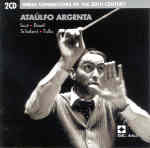Despite his high regard abroad, few of Spanish conductor Ataúlfo Argenta’s recordings have made it to CD. Even fewer of those are still available, the major exception being a Decca collection, “Espana”, that indicates his flair for colorful materials. His Debussy Images and Berlioz Symphonie fantastique, among other recordings from the dear old days of LP, remain lodged in the memory as justifying a reputation that extends well past the Spanish repertoire he conducted with unquestioned authority. Aiding that reputation is the romantic aura of his premature death at 45 in 1958 when he was at the brink of a major international career. So this compilation of Argenta recordings in EMI’s Great Conductors of the 20th Century is welcome, for even if it proves less than fully satisfying, it does include much of interest and should inspire a desire to hear more of his work.
The only Spanish selection here, Falla’s El amor brujo, indicates extraordinary gifts in this area of the repertoire. His is a stylish, idiomatic performance with total command of the work’s Spanish dance rhythms and plenty of forward momentum. Even more striking are his atmospheric slow movements and his ability to get the French orchestra to play like Andalusians. The solo winds are far from virtuoso caliber but the violin’s brief solo in the lovely Pantomime is all you could ask for. Mezzo-soprano Ana Maria Iriarte sings stylishly with a bright tone, but I miss the deep chest voice and Gypsy inflections that can make the part unforgettable. The brittle 1951 recording thins out textures to the point where full enjoyment is dampened. Better to stick with Frühbeck de Burgos on Decca who conveys the same drama with even more of the Gypsy flavors.
Argenta was noted for his conducting of French music too, but this colorful Ravel Alborada del gracioso, while worth hearing, is compromised by backward percussion, thin textures, and dynamic compression inflicted upon it by the subpar mono 1956 engineering. But even if the sonics were state-of-the-art, such expert Ravel performances as Reiner (RCA), Ozawa (DG), and Ansermet (Decca) in resplendent stereo bury it.
The one example of the core Austro-German repertoire is Schubert’s Symphony No. 9, where in 1957 Argenta conducts the same French Orchestre des Cento Soli he led in the Ravel, this time in stereo. The booklet says this was a recording band that for any given sessions may have been either a pickup group, the Paris Conservatory Orchestra, or the Lamoureux Orchestra. This performance opens with a watery horn solo and a sluggish introduction, then bursts quickly into a grand climax and maintains a steady forward momentum for the rest of the work. It’s a decent performance of the sort that could hold interest in a concert, but without any special insights that offer more than brute energy it’s in the lower-middle of the pack of available recordings, and nowhere near the exalted level of Szell, Krips, and Wand among others. The early stereo engineering doesn’t help; it’s bass-shy, with a wide, shallow stage and a harshness that makes it seem ear-wearyingly relentless.
The best item is the Liszt Faust Symphony in its original version, without the chorus in the “Mephistopheles” movement. Here, you sense the complete identification with the music that Argenta exhibited in the Spanish works he conducted. Drama and tension are steadily maintained, and the overall effect reminds us that Argenta also was noted for his Tchaikovsky. The “Gretchen” movement is especially outstanding, with tender warmth, delicate winds, and string phrasing that captures the character. Argenta also conveys the turmoil of “Faust”, and “Mephistopheles” is done with appropriate quicksilver finesse and an edginess that portray the devil’s capriciousness. The early stereo (1955) sound is adequate, the playing of the Paris Conservatory Orchestra committed.
































